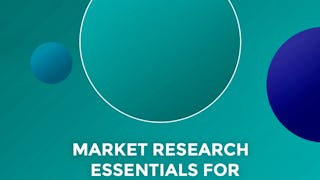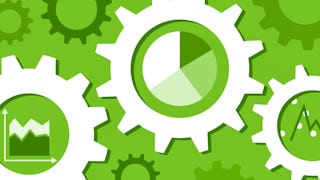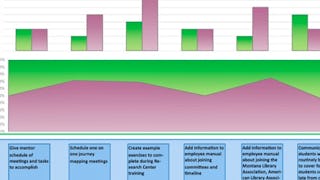- Browse
- Banking
Banking Courses
Banking courses can help you learn financial analysis, risk management, regulatory compliance, and investment strategies. You can build skills in credit assessment, portfolio management, and customer relationship management. Many courses introduce tools like Excel for financial modeling, Bloomberg terminals for market analysis, and software for risk assessment, showing how these skills are applied in real banking environments.
Popular Banking Courses and Certifications
 Status: NewNewP
Status: NewNewPPackt
Skills you'll gain: Business Process Improvement, Process Optimization, Quality Assurance, Digital Transformation
Intermediate · Course · 3 - 6 Months
 Status: PreviewPreviewB
Status: PreviewPreviewBBanco Interamericano de Desarrollo
Skills you'll gain: Financial Inclusion, FinTech, Digital Transformation, Mobile Banking, Product Design, Financial Services, Innovation, Banking, Data Analysis, Talent Management, Customer experience improvement, Needs Assessment, Emerging Technologies, Strategic Partnership
Beginner · Course · 1 - 4 Weeks
 Status: PreviewPreviewI
Status: PreviewPreviewIIE Business School
Skills you'll gain: Market Research, Business Research, Customer Insights, Data-Driven Decision-Making, Quantitative Research, Market Analysis, Business Intelligence, Competitive Intelligence, Market Opportunities, Marketing, Data Collection
Beginner · Course · 1 - 4 Weeks
 Status: PreviewPreviewD
Status: PreviewPreviewDDuke University
Skills you'll gain: Business Metrics, Analytics, Business Analytics, Business Intelligence, Performance Metric, Marketing Analytics, Big Data, Key Performance Indicators (KPIs), Data Analysis, Web Analytics, Case Studies, Data-Driven Decision-Making, Cash Flows
Mixed · Course · 1 - 3 Months

Skills you'll gain: User Interface (UI), User Interface (UI) Design, User Experience, User Flows, User Experience Design, Usability, Miro AI, User Centered Design, Process Mapping, User Research, User Feedback, Brand Awareness, Business Intelligence
Intermediate · Guided Project · Less Than 2 Hours
 Status: NewNewStatus: Free TrialFree Trial
Status: NewNewStatus: Free TrialFree TrialSkills you'll gain: Capital Markets, Investment Banking, Go To Market Strategy, Financial Market, Business Valuation, Underwriting, Market Dynamics, Price Negotiation, Due Diligence, Strategic Thinking, Corporate Finance, Compliance Management, Financial Regulation
4.9·Rating, 4.9 out of 5 stars7 reviewsMixed · Course · 1 - 4 Weeks
 Status: NewNewStatus: PreviewPreview
Status: NewNewStatus: PreviewPreviewSkills you'll gain: Cash Flow Forecasting, Business Valuation, Financial Modeling, Financial Forecasting, Revenue Forecasting, Risk Modeling, Capital Budgeting, Equities, Risk Analysis, Financial Analysis, Data Presentation, Private Equity, Investment Banking, Presentations, Mergers & Acquisitions, Model Evaluation, Case Studies, Microsoft Excel
Mixed · Course · 1 - 4 Weeks

Skills you'll gain: Data Storytelling, Data Analysis Expressions (DAX), Power BI, Statistical Reporting, Data Visualization Software, Dashboard, Pivot Tables And Charts, Microsoft Excel, Key Performance Indicators (KPIs), Data Manipulation, Business Intelligence, Cloud Services, Role-Based Access Control (RBAC), Data Integration, Data Security, Data Cleansing, Software Installation
Intermediate · Course · 3 - 6 Months
 Status: Free TrialFree TrialS
Status: Free TrialFree TrialSSkillUp
Skills you'll gain: Tableau Software, Peer Review, Data Storytelling, Dashboard, Presentations, Data Cleansing, Business Intelligence, Data Visualization Software, Data Visualization, Interactive Data Visualization, Data Quality, Data Preprocessing, Data Validation, Data Manipulation, Data Analysis, Key Performance Indicators (KPIs)
Advanced · Course · 1 - 4 Weeks
 Status: PreviewPreviewU
Status: PreviewPreviewUUniversidades Anáhuac
Skills you'll gain: Regression Analysis, Marketing Analytics, Business Intelligence, Data-Driven Decision-Making, Statistical Methods, Data Mining, Data Analysis, SPSS, Customer Analysis, Market Analysis, Statistical Analysis, Market Research, Consumer Behaviour, Microsoft Excel
Beginner · Course · 1 - 3 Months
 Status: NewNewStatus: PreviewPreviewU
Status: NewNewStatus: PreviewPreviewUUniversidad de Palermo
Skills you'll gain: Business Intelligence, Data Governance, Data Storytelling, Data Management, Business Analytics, Looker (Software), Performance Measurement, Data Visualization, Key Performance Indicators (KPIs), Business Metrics, Data Modeling, Data Warehousing, General Data Protection Regulation (GDPR), Digital Transformation, Star Schema, Data Mart, Data Quality, Talent Management, Team Building, Data-Driven Decision-Making
Beginner · Course · 1 - 4 Weeks
 Status: NewNewStatus: Free TrialFree Trial
Status: NewNewStatus: Free TrialFree TrialSkills you'll gain: Team Building, Workplace inclusivity, Team Motivation, Diversity and Inclusion, Team Leadership, Teamwork, Recognizing Others, Drive Engagement, Virtual Teams, Collaboration, Event Planning
Beginner · Course · 1 - 4 Weeks
Searches related to banking
In summary, here are 10 of our most popular banking courses
- The Ultimate BPMN Course: Packt
- Perspectivas en Transformación Digital: Inclusión Financiera: Banco Interamericano de Desarrollo
- Market Research Essentials for Marketing Management: IE Business School
- 데이터 중심 기업을 위한 비즈니스 지표: Duke University
- Generate a User Experience (UX) Onboarding Map in Miro : Coursera
- IPO Process: Analyze, Evaluate & Launch: EDUCBA
- Master DCF Valuation: Analyze, Forecast, and Present: EDUCBA
- Microsoft Power BI - The Complete Masterclass - 2025 EDITION: Packt
- Tableau Capstone Project : SkillUp
- Ciencia de Datos Aplicada al Marketing: Universidades Anáhuac










